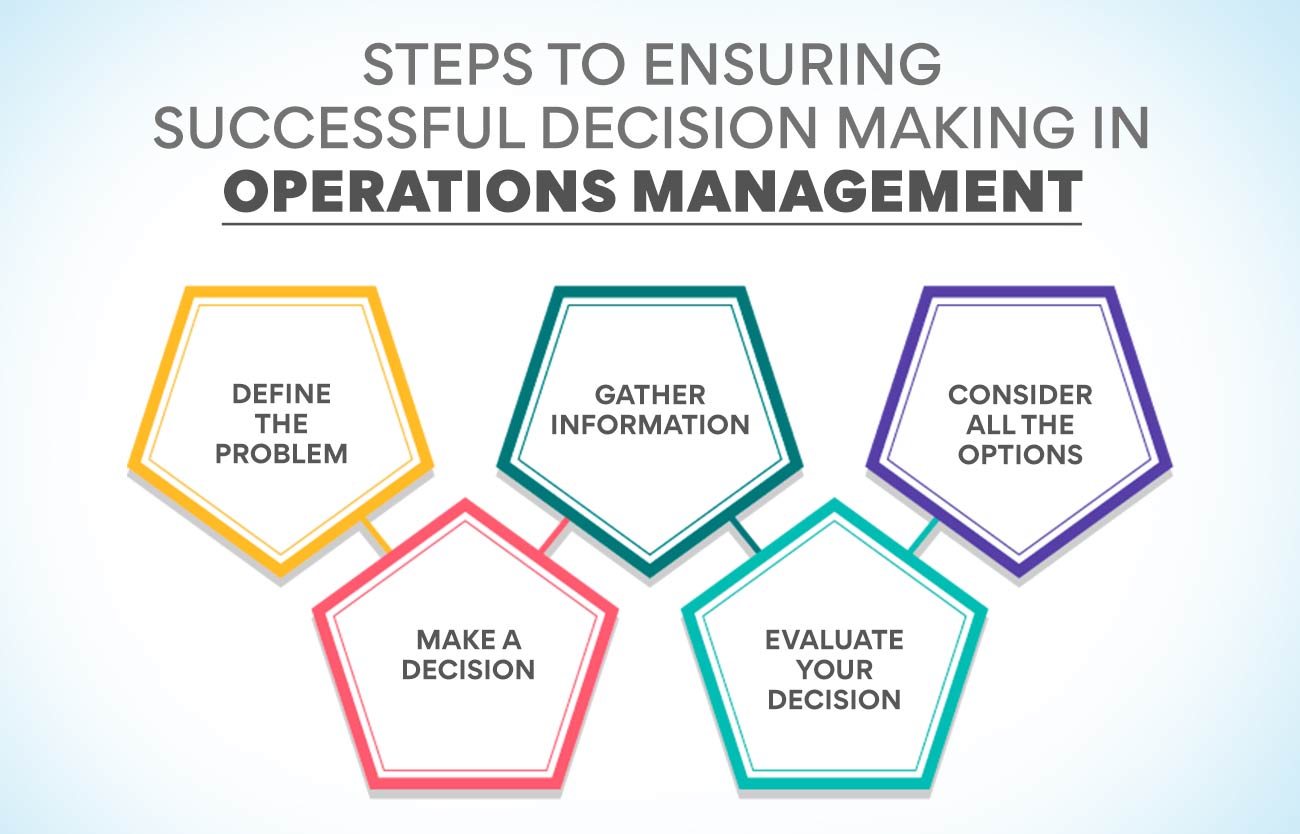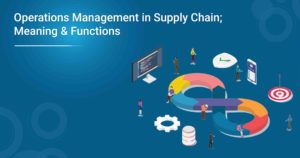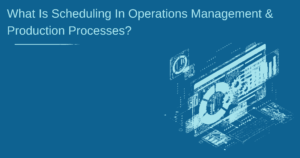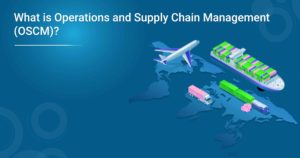Making sound operations management is critical to the success of any organization. If you make one wrong decision, it can ripple effect throughout your entire organization. That’s why it’s important to understand the key points related to decision-making in operations management. This blog post will discuss the most influential factors you need to consider when making operations management decisions.
What Is Decision-Making in Operations Management?
Operations management is the process of planning, scheduling, and controlling the operations of an organization. It involves the coordination of people and resources to produce goods and services.
Decision-making in operations management is the decision-making process about efficiently using resources to produce goods or services. Operations management decisions aim to maximize efficiency while meeting customer needs.
It will be no surprise that operations managers have to make many decisions. In fact, they may make dozens of decisions each day. Some of these decisions are routine, while others are more complex and require more transparency.
While it may not always be easy, decision-making is essential to operations management. Decision-making can be difficult, but operations managers must be up to the challenge. They need the knowledge and skills necessary to make sound decisions to help their organization meet its goals.
Operations managers are responsible for making decisions that will impact the operations of their organization. They need to be able to identify problems, develop solutions, and make decisions that are in the best interest of their organization.
Critical Points That Influence Decision-Making In Operations Management
There are a few critical points that influence operations management decisions. Here are the eight key points you need to know:
Ascertaining Company’s Objectives: The operations manager needs to be aware of the company’s objectives in order to make decisions that are aligned with these goals. It will streamline the operations and make it easier to achieve desired results. There is no shortcut to this; operations managers must be familiar with all aspects of the business.
Data-Driven Analysis: In operations management, decisions are often based on data and analytics. Operations managers need to be able to analyze data and draw insights from it to make informed decisions. It requires a strong analytical skillset.
Stakeholder Analysis: Operations managers need to be able to identify and assess the interests of different stakeholders. It will help them understand the impact of their decisions and choose the course of action that is most beneficial to all parties involved.
Cost-Benefit Analysis: There is no better way to make decisions than by doing a cost-benefit analysis. Operations managers need to be able to weigh the costs and benefits of different options before making a decision. It will help them choose the most beneficial option for the company.
Risk Analysis: Operations managers must identify and assess risks before making any decisions. It will help them avoid potential pitfalls and make the best possible decision for the company. For instance, if an operations manager is considering a new course of action, they will need to consider the risks involved and decide if the potential benefits are worth the risk.
Determining the Scope of the Decision: Once the objectives have been determined, the manager needs to decide on the scope of the decision. It will help them identify the parameters within which the decision needs to be made. For instance, for a brand new plan, they will need to decide how many resources are required and how much time needs to be invested.
Analyzing the Available Options: Operations managers need to be able to identify and assess the available options before making any decisions. It will help them choose the most beneficial option for the company. For instance, multiple options may be available, but one option may be more valuable in the long run, even though it requires more resources upfront.
Making the Decision: Operations managers must be able to make decisions quickly and efficiently. It requires a strong ability to think on one’s feet and make decisions under pressure. It may also need the operations manager to delegate authority to make decisions.
Also Read: What is Process design in Operations Management?
Steps To Ensuring successful Decision Making In Operations Management
According to the Institute for Operations Research and the Management Sciences (INFORMS), there are five steps to decision-making:
Step One: Define the Problem
The first step in making a decision is to define the problem. Operations managers must identify the problem and how it needs to be solved. It will help them identify the problem’s parameters and choose the best course of action. Defining the issue will also help operations managers understand the impact of their decision and its potential consequences.
Step Two: Gather information
Gathering enough information is vital in making strategic information. It is the area where managers need to do research and figure out what options are available. Managers must consider costs, time, and resources when making decisions. Once all the information is gathered, managers can make tactical decisions that work best for the business.
Step Three: Consider All The Options
The third step is all about considering your options. Here managers need to think about what could happen if they make a particular decision. What are the risks and rewards associated with each option? This step is about being realistic and thinking through each decision’s possible outcomes.
Step Four: Make A Decision
This may seem like the easy part, but it can actually be quite tricky. Managers must weigh each option’s risks and rewards and make the best decision for their operations. They must use their experience and knowledge to make the best decision possible.
Step Five: Evaluate Your Decision
The decision isn’t final until it is evaluated. This step is important because it allows them to see how the decision has affected the operations. It also allows them to learn from mistakes and make better decisions in the future. They should evaluate your decision regularly to ensure that it is still the best decision for your operations. It will help them improve operations and make better decisions in the future.
Also Read: What Is The Scope Of Operations Management?
Important Operations Management Decisions
Many decisions are involved in operations management, but some are more important than others.
Quality Management: Quality management decisions ensure that products and services meet or exceed customer expectations. It is one of the most critical aspects of operations management because it can directly impact customer satisfaction and loyalty.
Design Strategy: Design strategy decisions involve creating a plan for how products and services will be produced. It includes everything from deciding on the best production methods to selecting the right materials and suppliers.
Resource Planning Operations managers are responsible for making decisions about allocating resources within an organization. It includes both human and material resources. The goal is to ensure that resources are used efficiently and effectively. One of the most important aspects of resource planning is forecasting. It is the process of predicting future demand for resources. This information is then used to decide how to allocate those resources efficiently.
Process and Capacity Design: The operations manager must also be involved in process and capacity design decisions. The operations manager is responsible for ensuring that the facilities can handle the volume of work required and that the processes can meet the desired quality levels. If the operations manager is not involved in these decisions, likely, the facility will not be able to meet the needs of the business.
Inventory Management: Another key area of operations management is inventory management. Inventory management is about ensuring that a company has the right products in stock at the right time. To make sure that a company has the right amount of inventory on hand, operations managers need to be able to make quick and efficient decisions. It is the most critical decision in operations management that will save you a lot of money.
Supply Chain Management: The operations decisions are made to create value through the transformation process. The operations manager is responsible for the efficient and effective use of resources to produce goods and services. The operations manager makes decisions about the use of technology, quality control, capacity planning, and inventory management.
Human Resource Decision: Operations management is a field of business concerned with producing goods and services and involves the management of resources such as raw materials, equipment, and labor. Human resources will always be an important decision-making area that operations managers face. The reason is that operations managers must manage workers to achieve company objectives while ensuring the safety of employees. With decision matrix, SWOT analysis, and cost-benefit analysis, operations managers can make strategic decisions.
Scheduling Decision: It is the decision that involves creating a schedule for the production process. This includes deciding when to start and finish each task and how much time to allot for each task. This decision is crucial because it can impact the overall efficiency of the production process. It will directly impact the lead time, which is the amount of time it takes to produce a product.
Location Decision: The decisions operations managers affect not only the company they work for but also the community around them. A bad decision can lead to a loss of money and jobs, while a good decision can create new opportunities and wealth. The location you choose for your business operations is one of the most important decisions you will make to prosper your company. Considering the cost of land and labor, availability of resources, and proximity to the market will help make a well-informed decision.
Decision Making Is The Lifeblood of Operations Management
Operations management is all about making decisions. Every day, operations managers are confronted with choices that will directly impact the efficiency and effectiveness of their operations.
Some of these decisions are easy, but many are complex and require careful consideration. To make the best possible decisions, operations managers need to understand the different types of decisions they will face and the key factors that should be considered when making each type of decision.
Become An Operations Manager And Make Planned Decisions
A study by the Harvard Business Review found that operations managers who are effective at making decisions are twice as likely to be successful in achieving the goals of their operations.
The operations manager’s role is to ensure that a company’s operations are running smoothly and efficiently. To do this, they need to be able to make decisions quickly and effectively.
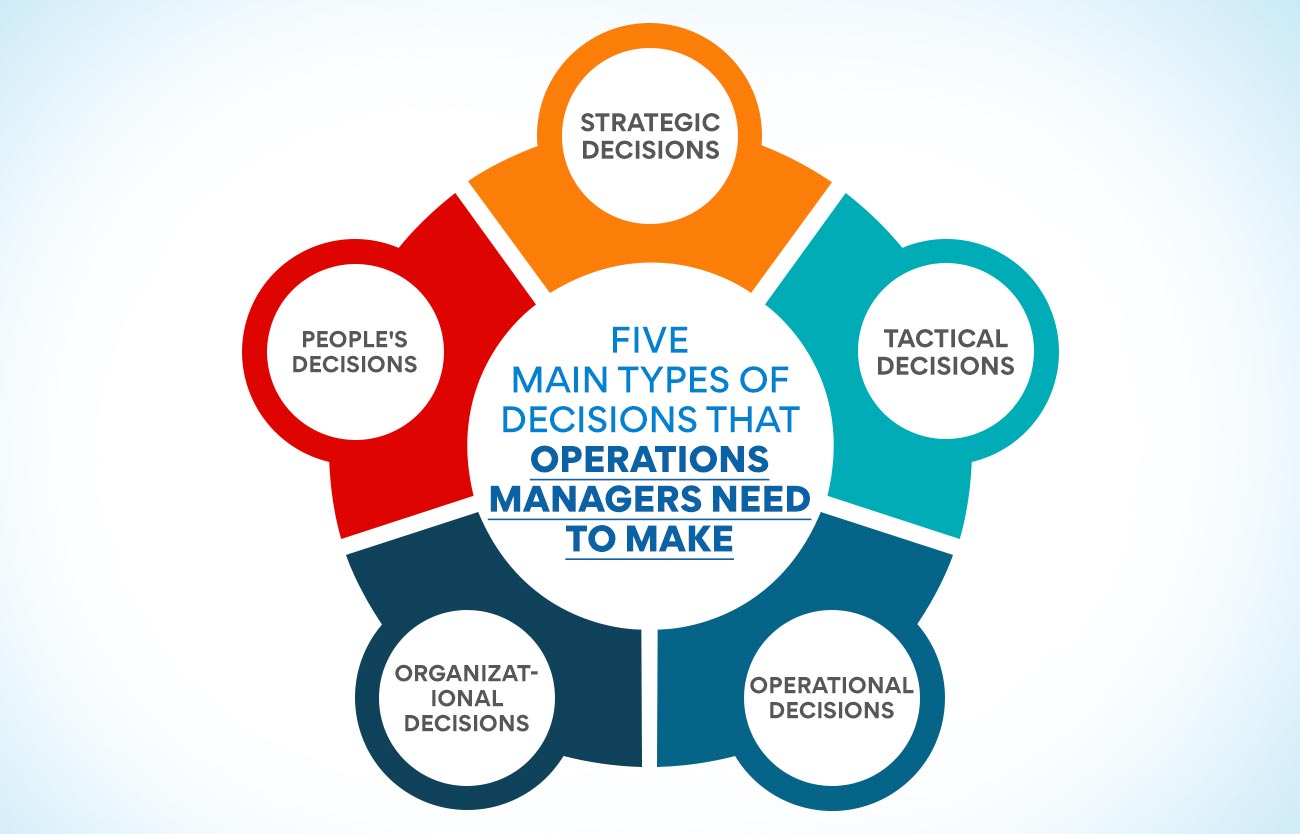
There are five main types of decisions that operations managers need to be able to make:
Strategic decisions: These are long-term decisions that will majorly impact the company’s operations.
Tactical decisions: Operations managers make decisions related to their organization’s day-to-day operations. These decisions are usually short-term and have a direct impact on the operations of the organization.
Operational decisions: Operational activities involve the use of resources to produce goods and services. The operations decision deals with the transformation process that converts inputs into outputs.
Organizational decisions: Organizational decisions are made to achieve organizational objectives. The operations manager is responsible for the efficient and effective use of resources.
People’s decisions: Just like the name suggests, people’s decisions are all about the workforce. The operations manager ensures that the right people are in the right place at the right time.
Each type of decision requires a different approach, but some general principles apply to all decision-making in operations management. Operations managers are responsible for making efficient and productive decisions that will best benefit the business objectives and bring substantial results to the company. All the important decisions should be:
- Based on a clear understanding of the operations environment
- Supported by data and information
- Made using a systematic and logical approach
Skyrocket your career in operations management and learn how to make better decisions with our three-in-one Operations, Supply Chain, and Project Management course. You will have the flexibility and freedom to learn at your own pace and get operations management certified, which will bag you a great job in this flourishing industry. So what are you waiting for? Start your operations management journey today!
More Information:
What is Operations and Supply Chain Management (OSCM)?







